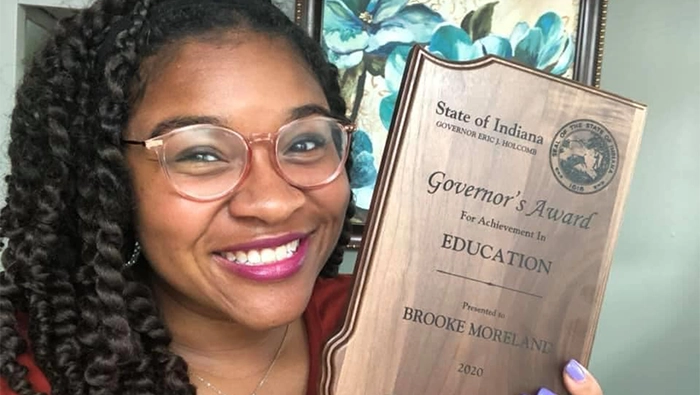Brooke Moreland’s family was homeless when she joined Key Club. The skills and “grit” she built there took her to CKI, Harvard and beyond.
By Julie Saetre
In 2003, on Brooke Moreland’s first day at Broad Ripple High School in Indianapolis, Indiana, U.S., she was looking for her locker when she came across of group of students sitting on the floor, painting a banner for a football game. She peered into the classroom behind the students and saw a woman observing the creative session. “What are you guys doing?” she asked the woman.
The answer: The students were part of Key Club International, a community service organization for high school students in the Kiwanis International family.
Intrigued, Moreland began attending Key Club meetings and quickly became invested in the group’s many service opportunities. Eventually, she became the club’s president.
It wasn’t such an unusual way to become involved with Key Club — but Moreland’s personal situation at the time was.
“I started my service with Kiwanis at a really interesting point in life,” she says. “When I was in high school, our family lost our home. So we lived in a couple of shelters across the city. What was really significant, even through that hardship, was that I still kept volunteering.”
The grit to keep going
Moreland credits Key Club, and the support and mentorship of that club advisor she spoke to the first day, with helping her develop the strength and determination to continue her leadership and service journey.
She calls it “grit.” And she defines it this way: “No matter your circumstances, your background, just having that firmness of mind or spirit, that unyielding charge, that in the face of hardship, you can still serve — even being that 16-year-old who lost their home — and people can serve you.”
It’s not surprising, then, that when Moreland attended Butler University in Indianapolis after high school graduation, she would bring that commitment to service with her. Butler’s Circle K International club was inactive when Moreland began her studies in 2007, so she contacted an upperclassman and reactivated the club. She would go on to serve as lieutenant governor for the CKI Metro-Fields Division.
“If you see it, you’re already there”
As a resident assistant in one of the university’s dorms, Moreland implemented service-learning opportunities for those rooming there. One of those was a program she called Holding Hands with Our Future, which she launched in the fall 2008. Her mother had started a book club for Moreland’s 7-year-old brother and wanted to show the young members where reading and literacy could take them.
Moreland invited the group to Butler for a day. She paired each child with a resident at her dorm. In the morning, the children attended classes with their new mentors, then shared lunch and talked about the opportunities college could offer.
“Everyone liked it so much, we continued the program in the second semester,” she says. “It became so popular that I founded a nonprofit called the Rose of Hope Foundation when I was 19. That was my first experience giving birth to a service-learning program meant to impact others.”
Rose of Hope targeted students who didn’t believe they could go to a college or university. They weren’t doing well in school, and they didn’t see education after high school as a realistic goal.
“We wanted to bring them on campus and get them really excited about the possibility,” Moreland says. “The main theme was, ‘If you can see it, you’re already there.’ It sounds like magic, but it’s true. If you see yourself somewhere, you start wanting to talk to people who value being there. You start doing better because you want to be there. You become integrated into this community of value. That puts you on a different trajectory. It demystifies the barriers that we put into our own minds.”
A full-circle moment
Moreland would earn a master’s degree through the Indiana University-Bloomington Higher Education and Student Affairs program and receive a doctorate from Indiana Wesleyan University’s Organizational Leadership and complete a graduate certificate program from Harvard with the CAEL program in Cambridge, Massachusetts, U.S.
Today, she works at the Indiana University School of Education – Indianapolis as associate director for Community Engagement and Coalition Building in the Collaborative for Equitable and Inclusive STEM Learning (CEISL). CEISL is a set of grant-funded initiatives designed to provide sustainable support in lifelong learning with technology — especially for learners from structurally marginalized identities and communities.
It’s a long way from the challenges she confronted in a family facing homelessness.
“To come out on the other side and now be working, mentoring and continuing service leadership — it’s a full-circle moment,” she says. “It’s beyond just a philosophical call to action. It becomes the fabric of someone’s mindset. You have the opportunity to then make your mark in the world.
“Anytime I’m tapped to volunteer or speak for anything Kiwanis, I’m always onboard.”

